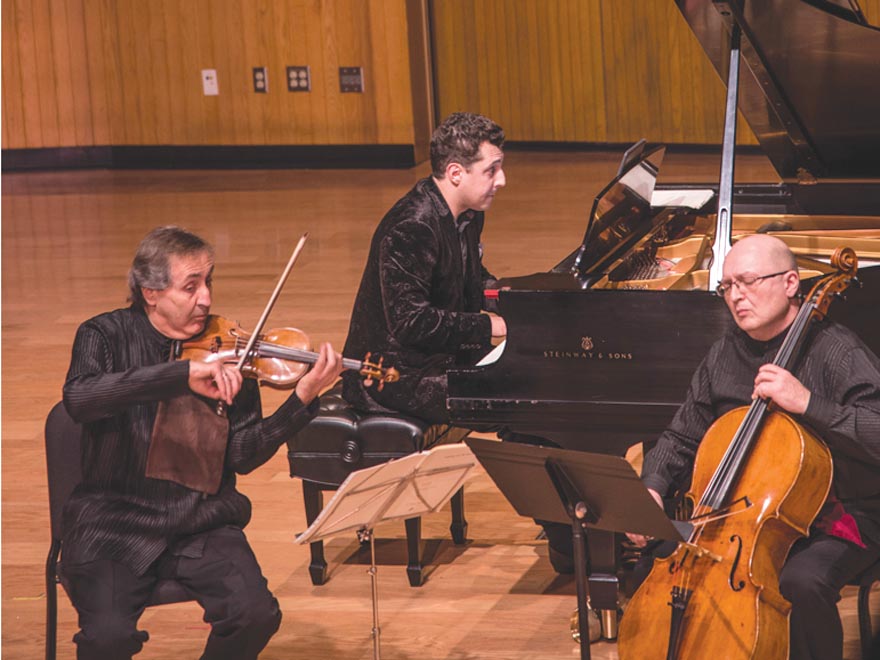
Bagratuni performing at the March 2 concert.
Photo: Hourig Attarian
Katrina Bissett
Staff Writer
On Friday, March 2, 2018, the Chilingirian-Bagratuni-Hakobyan Trio performed on the Fresno State campus. The concert was co-presented by the Philip Lorenz Memorial Keyboard Concerts International Chamber Music Series, Orpheus, and the Armenian Studies Program. The featured musicians were Levon Chilingirian on violin, Suren Bagratuni on cello, and Karén Hakobyan on piano. They performed a set of three pieces; the first half consisted of Haydn’s Trio in C Major, Hob. XV:27 and Piano Trio in F-sharp Minor by modern Armenian composer Arno Babadjanian. The concert was dominated by the second half, which was entirely devoted to the performance of Beethoven’s Trio in B-flat Major, Op.97, or “Archduke.”
The Thomas A. Kooyumjian Family Foundation was a major supporter of the evening’s performance, together with the Armenian General Benevolent Union, Fresno Chapter, and the Hamazkayin Armenian Educational and Cultural Society, Taniel Varoujan Chapter.
The opening piece was truly Mr. Hakobyan’s time to shine. Born in Armenia, he trained at the Tchaikovsky Music School in Yerevan and continued his collegiate training in the United States. Mr. Hakobyan’s natural talent and years of dedicated practice were highlighter through the Haydn; there was no hint of the staunch pompousness that often accompanies the performance of the Classical master. Rather, Hakobyan invoked sweet, naturalistic images that hearkened back to the Romantic era–there was no squareness in his playing, only beauty, but with no sacrifice of the technical brilliance that defined the Classical period.
Suren Bagratuni was the best-kept secret of the night. There was no doubt that he was a talented musician, but the Haydn did not seem to be the proper platform to display his abilities. It was only when he played the Babadjanian that the secret was revealed to us all. Bagratuni, an internationally renowned, Armenian-born cellist, brought forth an ancient stirring in the soul from the first note of the Babadjanian. His talent, unlike Hakobyan, was not to paint images, but to pull out the deepest lament of the soul. While the quicker pace of the Allegro is not usually suited to a lament, he brought forth a primordial magic from the audience, moving us all with the deep passion that was evident within his playing.
Babadjanian drew out the best in Levon Chilingirian as well. He was born in Cyprus and emigrated to London and has had a career that has taken him all over the world and led him to teach in some of the most prestigious academies in London. There is no doubt that his accolades are well-earned; his was perhaps the sweetest violin music that I have ever heard. The Andante movement featured a call-and-response between the cello and violin. Chilingirian would return passages within the highest range possible, but with the purest tone. When he played, it was as though the stars were singing.
The Beethoven allowed the trio to shine as an ensemble; they were completely locked in, each player perfectly in sync. They accomplished the daunting task of maintaining energy through the entire piece, roughly 45 minutes. It felt like a great victory had been achieved when they finished –to say it was a night of beauty would be an understatement.
What they did was not just an entertaining thing, not just a beautiful thing, it was a good thing. I, for one, am better for it.
 Hye Sharzhoom Armenian Action
Hye Sharzhoom Armenian Action